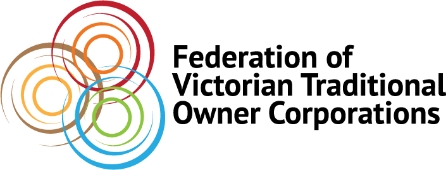“For a decade, the Federation has progressed the ambitions of Traditional Owners across Victoria, through engagement and advocacy.
The strength and generosity of our member Traditional Owner corporations underpins our work and is rewarded by our achievements. It is their collective visions for self-determination of Country and Culture, that sets the agenda for the Federation to find government pathways to realise these visions. Without members setting this direction and strengthening the Federation’s collective voice, the work would fall to individual corporations or not be undertaken at all.
To be a Federation is to have allies, to come together. The very word comes from foederar (to ally) and foedus (league). Membership of the Federation is an essential way to raise our voices over shared concerns and celebrate our communities and achievements.
The work the Federation does to progress the ambitions of Traditional Owners across Victoria, through engagement and advocacy, provides a state-wide perspective.
Playing an active role in national policy development and assertion of a Victorian Traditional Owner perspective, discussing their concerns in broader considerations of First Nations rights and ambitions, policy and regulatory change, is an increasing focus for the Federation.”
-Cassandra Lewis, Chairperson
“Looking back over ten years of consistent, visionary work, it is clear that we have contributed to changing the regulatory and statutory landscape in which Victorian Traditional Owner corporations do their important work.
It is also clear that in advocating change on that level, change is also made to the everyday lives of Aboriginal peoples everywhere.
We have put cultural fire and cultural water on the agenda for government, sought greater protections for Indigenous Cultural and Intellectual Property, fought for a fair place in the expanding Native Foods and Botanicals industry, supported a drastic reconsideration of how our cultural heritage is approached at both state and national levels and worked to have economic development considered as more than just small business grants.
If we are serious about closing the gap, we must also be serious about nation building and Traditional Owners having real decision making on Country and in their communities. Now is not the time to pause but continue to critically examine the regulatory and statutory barriers to connection to, caring for and thriving on Country.
Let’s make sure that for the next ten years, Federation continues to be at the forefront of Aboriginal led advocacy and policy, putting Traditional Owners and their representative and inclusive corporations at the decision-making table.”
-Paul Paton, CEO
TIMELINE OF ACHIEVEMENTS
On June 27, the Federation of Victorian Traditional Owner Corporations is registered with the Australian Securities & Investments Commission. The establishing members are the Barengi Gadjin Land Council, Gunaikurnai Land and Waters Aboriginal Corporation and Native Title Services Victoria (NTSV).
The Federation’s objectives are:
• The promotion of economic development and self-determination of Traditional Owner Corporations in Victoria.
• Assisting Traditional Owner Corporations to manage their land and promote environmental and cultural protection of their country.
• The promotion of the interests of the company, its members and Aboriginal people more generally, to Government and other bodies to make representations or submissions on relevant matters of law, legislative measure or policies.
• Support and promote mutually beneficial collaboration and partnership arrangements between Traditional Owner Corporations owned social and commercial business enterprises in Victoria.
• Relief of poverty, sickness, suffering, distress, misfortune, destitution and helplessness amongst Traditional Owners in Victoria.
Later that year, the Dja Dja Wurrung Clans Aboriginal Corporation, Eastern Maar Aboriginal Corporation and Wurundjeri Tribe and Compensation Cultural Heritage Council become members.
On August 2, the Federation is registered as both a public company limited by guarantee under the Corporations Act 2001 (Cth) and as a charity (Public Benevolent Institution) with the Australian Charities and Not-for-profits Commission.
Federation Enterprises is established as Federation Heritage Services. A for-profit, wholly owned subsidiary of the Federation, the role and function of Federation Enterprises is to establish joint venture companies with at least 51% ownership, particularly with a view to leveraging government procurement opportunities.
Taungurung Clans Aboriginal Corporation become members.
Barpa Pty. Ltd. is Federation Enterprises’ first joint venture, partnering with the award-winning multi-national construction company Icon. The partnership builds on the strengths of the two entities to offer an Indigenous solution for capital works projects across Australia.
First People of the Millewa-Mallee become members.
On Country Heritage and Consulting is established as a Federation Enterprises joint venture, partnering with Terra Rosa Consulting to provide services relating to cultural heritage management, natural resource management, Aboriginal engagement, capacity development, training, and mediation.
The Bunurong Land Council become members.
A group restructure is undertaken, and Federation becomes the sole member of NTSV now First Nations Legal & Research Services (First Nations), making NTSV a wholly owned subsidiary of the Federation.
Koori HR is established as a Federation Enterprises joint venture, partnering with HR Links of the Rusca Group to provide recruitment and labour hire services in the civil, mining, oil & gas and construction sectors.
Following the restructure to grow the organisation and build capacity for our advocacy and advisory services, we now operate with our own structure and resources. Key to the new operational structures is the appointment of the inaugural CEO, Marcus Stewart.
We become a foundation member of the Victorian Aboriginal Executive Council, established to provide a self-determining collaboration, policy development and advocacy mechanism for Victoria’s peak, lead and state-wide Aboriginal Community Controlled Organisations.
Contributing to our policy work, we establish and provide secretariat support to the Natural Resource Management Collaborative Body, so that Traditional Owners and senior government representatives can coordinate and develop natural resource management policy.
We host the Traditional Owner Strategic Alignment Forum so that Traditional Owners, their corporations and government ministers can participate in open dialogue on strategic priorities including for legislative reform, self-determination, Treaty, as well as partnership, engagement and accountability with the State.
Our Chair, Janine Coombs, and CEO, Marcus Stewart, attend the United Nations Permanent Forum on Indigenous Issues to learn from and strengthen our ties with our international counterparts in implementing Treaty.
After significant consultation and policy development, the Federation developed Victorian Traditional Owner Cultural Fire Strategy is launched by Minister D’Ambrosio. Over 50 fire knowledge holders from across Victoria contributed to the development of the Strategy, which provides a set of principles and strategic priorities along with a policy and practice framework for effective Traditional Owner-led cultural fire management in Victoria.
Continuing to participate in national policy development, we co-host the National Native Title Conference with the National Native Title Council.
Focusing on our commitment to knowledge sharing, we establish a Forum for the CEOs of Victoria’s Traditional Owner Corporations to share information and experience across a range of policy and practical matters affecting the corporations and their communities.
Focusing on economic development for Traditional Owners, we partner with Agriculture Victoria to support Aboriginal-owned businesses and organisations to develop a thriving local native foods and botanicals industry through the Djakitjuk Djanga program.
To advance the Treaty process, we hold 29 facilitated meetings tailored to the needs and circumstances of groups in both formally recognised or not yet formally recognised areas.
In response to our advocacy, the Victorian government announced a $13.6 million Traditional Owner Nation-building Package, extending the program with a further $11.12 million in 2021 to enable a wide range of nation-building activities and expand important services and resources for Traditional Owner groups.
After strong advocacy, the Victorian Attorney-General launches the First Principles Review to comprehensively examine the content of agreements under the Traditional Owner Settlement Act 2010. We conduct a comprehensive review of the Settlement Act and all associated policy and legislation.
We become a foundation member of the Victorian Aboriginal and Local Government Strategy Steering Committee, ensuring that the Strategy aligns with the Victorian Aboriginal Affairs Framework 2018-2023, the Victorian Treaty process, the Victorian Closing the Gap Implementation Plan and the work of the Yoorrook Justice Commission.
Continuing our economic development work in the establishment of a culturally authentic native foods and botanicals industry through the Djakitjuk Djanga program, thirteen successful programs are announced.
Federation CEO, Paul Paton, joins the Victorian Aboriginal Economic and Employment Council and the Koori Caucus, supporting our advocacy for an Indigenous Preferential Procurement Policy.
Throughout 2020, we undertake extensive consultation to develop the Victorian Traditional Owner Cultural Landscapes Strategy. Facilitated by the Federation, but led by Victorian Traditional Owners, Elders and Knowledge Holders and Traditional Owner Corporation Staff, the Strategy development was overseen by a Traditional Owner Technical Working group and a Co-Governance Group.
A core component of the Traditional Owner Nation-building Package is the Nation-building Resource Pool. Administered by the Federation, the Resource Pool provides $5.835 million in flexible funding for nation-building projects that can be delivered by June 2024.
Continuing our strong work in policy development, we facilitate the development and release of the Traditional Owner Native Foods and Botanicals Strategy, contributing to cultural strengthening and sustainability of First Nations in Victoria by recognising rights and interests regarding biocultural species and their associated knowledge and practices.
Victorian Traditional Owners launched the Victorian Traditional Owner Cultural Landscapes Strategy, redefining the connection to Country for the world’s oldest living culture. Facilitated by the Federation and developed in partnership with the Department of Environment, Land, Water and Planning (DELWP) and Parks Victoria, the Strategy is the first of its kind in Australia and sets out a framework to systematically enable Victorian Traditional Owners to lead planning and activate cultural knowledge and practices to manage Country.
In close collaboration with Traditional Owners across Victoria and a Project Steering Group including Department of Jobs, Precincts and Regions (DJPR), the Game Management Authority, Parks Victoria and DELWP, the Federation developed Traditional Game Management Strategy is launched.
We establish a tri-party to oversee and support Traditional Owners’ input to the development of a Roadmap for Aboriginal Access to Water for Economic Development. As part of this project, 20 Traditional Owners and First Nations representatives were resourced to attend over 40 workshops and meetings from December 2018 to March 2021. The resultant Cultural Water for Cultural Economies report was released in March.
Continuing our policy and knowledge sharing work, our six Treaty Discussion Papers are released. Providing a foundational resource for the First Peoples’ Assembly of Victoria and Traditional Owners, the papers are informed by insights and questions posed during Traditional Owner treaty engagement meetings held in 2019-2020.
Federation CEO Paul Paton joins the Victorian Aboriginal Economic and Employment Council and the Koori Caucus, contributing significantly to the development of the new Victorian Aboriginal Economic and Employment Strategy, Yuma Yirramboi (Invest in Tomorrow in the Wurundjeri Woi Wurrung language).
We host Yarning Circles with Traditional Owner Corporation, supported by DJPR. Their focus is sharing knowledge and analysis of several emerging and rapidly developing sectors with potential for economic development.
The new Victorian Aboriginal Economic and Employment Strategy, Yuma Yirramboi (Invest in Tomorrow in the Wurundjeri Woi Wurrung language) is released. We have contributed significantly to its development through our participation on the Victorian Aboriginal Economic and Employment Council Koori Caucus , helping ensure and shape the focus on Traditional Owner groups interests.
On 1 July we de-couple from First Nations by withdrawing as their sole member. This restructure is undertaken because we feel that de-coupling would better meet community expectations for accountability and respond to a perceived need for there to be a clearer distinction between the roles of each organisation.
The Victorian Aboriginal Local Government Strategy is released. We have provided critical advice to the development of the Strategy through participation on the Aboriginal Steering Committee, testing the strategy through key forums and signalling the need for a stronger focus on Traditional Owners and their representative structures and advocating for resourcing to support its implementation.

